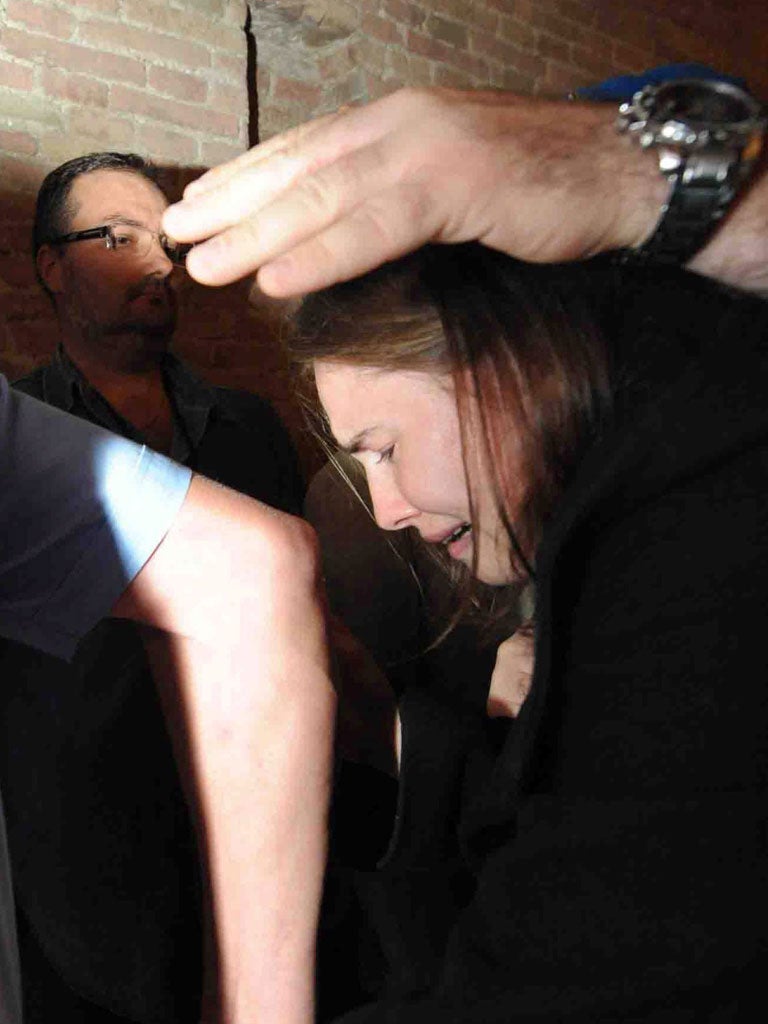Amanda Knox: Lucrative but dubious fame of interviews and memoirs beckons

Your support helps us to tell the story
From reproductive rights to climate change to Big Tech, The Independent is on the ground when the story is developing. Whether it's investigating the financials of Elon Musk's pro-Trump PAC or producing our latest documentary, 'The A Word', which shines a light on the American women fighting for reproductive rights, we know how important it is to parse out the facts from the messaging.
At such a critical moment in US history, we need reporters on the ground. Your donation allows us to keep sending journalists to speak to both sides of the story.
The Independent is trusted by Americans across the entire political spectrum. And unlike many other quality news outlets, we choose not to lock Americans out of our reporting and analysis with paywalls. We believe quality journalism should be available to everyone, paid for by those who can afford it.
Your support makes all the difference.Amanda Knox told the final hearing of her appeal against conviction yesterday: "I want to return to my life, my future." But what sort of life does the future hold for a young woman world-famous for not having committed a brutal murder?
It is easier to say what she definitely won't be doing. An Italian public relations executive last week floated the idea that, if she were exonerated, Ms Knox could have a glittering future as the image for various brands in Italy. With only around half of Italians convinced that she is innocent – more young women than young men are doubtful about her, according to a new survey conducted by an Italian university – it would be a brave company that adopted her as its public face. More to the point, there are few things one can imagine Amanda Maria Knox wanting to do less.
When she returns to the United States, she will run the gamut of the accidental celebrity, starting with the first, well-remunerated TV interview. Those who believe she has endured four years of jail for nothing will not begrudge her the fee, especially as her far-from-wealthy family has risked bankruptcy in the effort of supporting her morally.
Then what? She is on record as telling the Italian MP Rocco Girlanda, who visited her regularly in prison and wrote a book on the basis of their conversations, that she dreams of becoming a writer. She has kept a diary in jail; once she gets back to the US, publishers will be jostling to sign her up to write her own version of what happened in Perugia that November night four years ago and her account of the trial and jail. More than 10 books about the case have already been published, but her memoir would effortlessly trump them all.
These are the dubious perks of fame, but she made clear to Mr Girlanda that this sort of fame did not appeal to her. "How ugly to be famous for this!" she said. "I would prefer to be famous for something I did, or built, or achieved ..."
Yet famous she is, and the extent of her fame will take some digesting for a person who has been institutionalised and cut off from the outside world for four years. The other dream she admitted to Mr Girlanda was banal enough – to get married – though she told him she would rather adopt than have children of her own "because there are a lot of kids in this world who have no one".
But the fact of fame will open up new vistas if she cares to contemplate them. To the world that only glances at the gruesome headlines, Ms Knox is a spoiled, drug-taking American girl with loose morals. But conversations with those who know her best reveal a person who, according to her stepfather Chris Mellas, was intellectually smart, "dumb as a rock" in the ways of the world, but with a well-developed social conscience. Mr Mellas said that his daughter was worlds away from the media image of Foxy Knoxy: sexually shy and unassertive, but bold in challenging authority on matters of principle.
"Throughout high school she was very reserved," he said. "She didn't have a boyfriend, but she was involved in activism. She went to a Catholic school and a couple of her friends were gay or lesbian."
She decided to petition the school to create a gay/lesbian organisation. "So she went to the dean and convinced her, alone. She did it when she was 16. We talked about it, I said, wow, you're really bugging the system there, going up against it. But I thought it was kind of cool, sticking up for the underdog."
Ms Knox's best friend from home, Madison Paxton, who recently moved from Seattle to Umbria to be close to her, remembers her compassionate eccentricity. She used to approach strange men in parks, she told Rolling Stone magazine, she chatted with them and asked: "What's going on in your life?"
Join our commenting forum
Join thought-provoking conversations, follow other Independent readers and see their replies
Comments